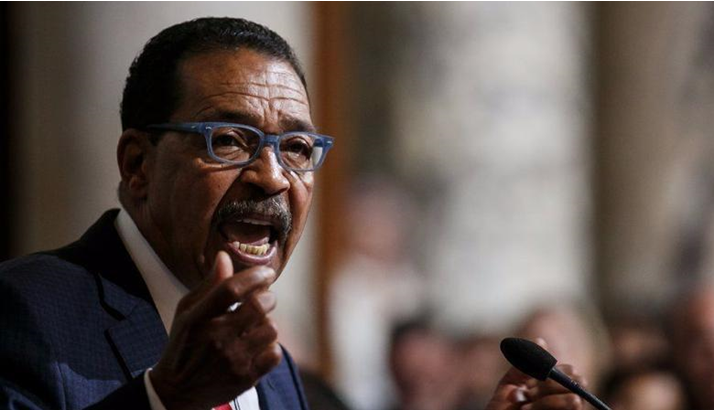Comments@THE GUSS REPORT-A bill of attainder is a law that unconstitutionally singles out an individual or group for punishment without a trial.
It is intended to prevent legislatures, like the LA City Council, from acting as a judiciary.
In a recent memo from Sharon Tso, the city’s Chief Legislative Analyst, to the LA City Council, she repeatedly provides justification for singling-out and progressively punishing “the same few individuals” whose obnoxious comments at City Council’s meetings have been declared “disruptive.” Tso affirms, with the approval of an un-named Deputy City Attorney, that doing so is justified and legal.
On Tuesday, if City Council passes its agenda item #19, which seeks to retaliate against such harsh, constitutionally protected criticism, Tso’s memo will be front and center in litigation that the city knows will be coming. It is a bill of attainder in both fact and in its intent.
But that agenda item underestimates the consequences of passing it. It states, “The Council may recess to Closed Session to confer with its legal counsel relative to the above matter based on a significant exposure to litigation, pursuant to Government Code Section 54956.9(d)(2) and (e)(4). (One potential case.)”
The mistake being made here is that City Council only anticipates one legal action.
But things may become much worse for City Council before they become any better. If they do not pass item #19, or water it down to irrelevance, their public meetings are likely to be filled with even harsher, more personal criticism at its meetings.
In other words, City Hall has backed itself into a corner, and all of it stems from City Council President Wesson’s increasingly restrictive rules on public participation at City Hall’s dozens of public meetings each week. And right now, the last thing City Council needs is more uncertainty about how to deal with harsh criticism.
Last week, at one of City Council’s three main meetings, Yvonne Michelle Autry, a Skid Row activist and occasional CityWatch contributor, was randomly declared by Wesson to be “disruptive.” She was ejected from the meeting under threat of arrest by the LAPD. But a few minutes later, during adjourning motions, Autry returned to the meeting to finish her vociferous criticism, particularly of Wesson. But removed once again, Autry was neither detained nor arrested, meaning that should other critics be detained or arrested, they most likely would claim unfair, targeted punishment for what amounts to less-disruptive behavior.
One reason why City Council may be so protective of its lengthy, often inefficient meetings is that it loses control over messaging and image virtually everywhere else.
One night last week, almost every 11 p.m. news broadcast in LA led off with a grinning City Councilmember David Ryu being shouted down by infuriated suburbanites yelling, “recall, recall!”, as he explained why their NIMBYism toward proposed homeless shelters located, in this case, in Sherman Oaks, was wrong and mean-spirited. Other Councilmembers, including Wesson, Joe Buscaino and Mike Bonin also have faced recent high-profile recall threats and shout-downs.
In fact, LA City Councilmembers have become so shell-shocked by criticism, and the fear of simply misstating things to the media, that they rarely speak directly to mainstream reporters anymore. In a recent LA Times article, reporter David Zahniser stated that Wesson would not provide comment on a relatively innocuous issue, but that his thoughts were provided through his spokesperson.
By contrast, meetings conducted by the LA County Supervisors are vastly more tolerant of critics in terms of their content, tone, the amount of time given to the public to speak, and the fact that the Supervisors are almost always in their seats, facing – and listening to – their harshest critics. That might be because its Chair, Supervisor Sheila Kuehl, is a Harvard-educated attorney who was a law professor at USC, UCLA and Loyola, and understands the First Amendment much better than Wesson. The other real difference here is Wesson’s legendary vindictiveness.
Maybe the best solution is for Wesson, Tso, City Attorney Mike Feuer and the entire LA City Council to take a day off for a field trip across Grand Park to observe how the County runs its meetings and learn how this whole free speech thing works. While Kuehl is the only local politician who is shorter in stature than Wesson, she stands head and shoulders above him when it comes to freedom of speech.
(Daniel Guss, MBA, is a member of the Los Angeles Press Club, and has contributed to CityWatch, KFI AM-640, Huffington Post, Los Angeles Times, Los Angeles Daily News, Los Angeles Magazine, Movieline Magazine, Emmy Magazine, Los Angeles Business Journal and elsewhere. Follow him on Twitter @TheGussReport. Join his mailing list or offer verifiable tips and story ideas at [email protected]. His opinions are his own and do not necessarily reflect the views of CityWatch.) Edited for CityWatch by Linda Abrams.
















